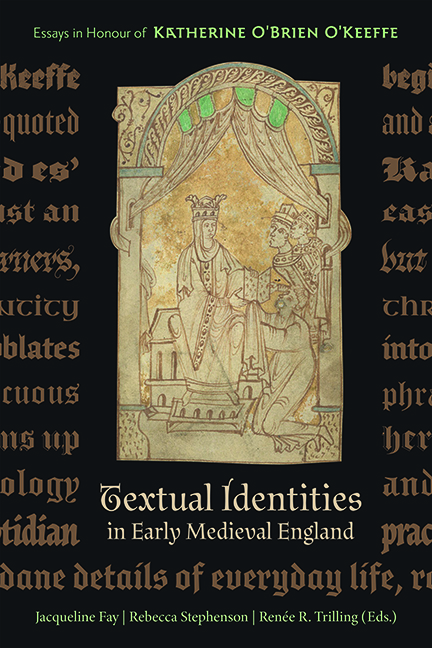Book contents
- Frontmatter
- Contents
- List of Illustrations
- List of Contributors
- Acknowledgments
- List of Abbreviations
- Introduction
- Part One Affect and Embodied Cognition in Medieval Didactic Texts
- Part Two Sovereignty, Power, and English Textual Identities
- Part Three Acts of Public Record in Making and Sustaining Communities
- Overview Of Career
- The Writings of Katherine O’Brien O’Keeffe
- Bibliography
- Index of Manuscripts
- General Index
- Tabula Gratulatoria
- Anglo-Saxon Studies
10 - St Rumwold and the Social Network of Belief
Published online by Cambridge University Press: 26 May 2022
- Frontmatter
- Contents
- List of Illustrations
- List of Contributors
- Acknowledgments
- List of Abbreviations
- Introduction
- Part One Affect and Embodied Cognition in Medieval Didactic Texts
- Part Two Sovereignty, Power, and English Textual Identities
- Part Three Acts of Public Record in Making and Sustaining Communities
- Overview Of Career
- The Writings of Katherine O’Brien O’Keeffe
- Bibliography
- Index of Manuscripts
- General Index
- Tabula Gratulatoria
- Anglo-Saxon Studies
Summary
UNLIKE HIS grandfather and father who converted to Christianity as adults, St Rumwold of Buckingham proclaims at the moment of his birth, ‘Christianus sum, christianus sum, christianus sum.’ Yet, he immediately asks to be baptized, because ‘cupio christianus effici’. The precocious infant saint in the eleventh-century Vita S. Rumwoldi raises questions about the role of agency in the formation of Christian belief, particularly during the process of initiation. Why does an agent proclaiming an identity need ritual to effect it? The tension between Rumwold’s infancy and his miraculous capacity to speak complicates this question. Narrowing the period between physical and spiritual births foregrounds the question of agency in conversion.
Recent scholarly conversations about ancient children have shifted from ‘seeing children solely as passive objects of various socializing forces’ to investigating how children ‘have an active role in growing and learning processes, transforming and renewing the cultural heritage they were born into’. An agent-centered approach has likewise transformed questions scholars ask about how individuals participate in and shape their religious communities.
The Vita S. Rumwoldi, a story about an infant confessor, illustrates the social network of belief in eleventh-century England. To examine the role of agency in this network of belief, I turn to Katherine O’Brien O’Keeffe’s analysis of contemporaneous literary representations of obedience. In Stealing Obedience, she probes how professed-religious agents perform and improvise obedience within tightly regulated monastic identities. The Vita S. Rumwoldi parallels and differs in a secular context as lay agents willingly perform and improvise belief to generate Christian identities. For narratives of belief, like narratives of obedience, produce religious identities in ways that may be gauged by collective agent action and be renewed by individual improvisational agency.
The Vita S. Rumwoldi is a narrative that textualizes the culture of Christian conversion in early medieval England. In this narrative, two social practices structure belief – belief is embodied in the ritual of baptism, and belief is articulated in the profession of faith. These companion practices define the boundaries of belief by figuring and regulating Christian identity. Characters in the story exercise agent action by performing the set of practices that were designed to make a Christian: Rumwold's family choose to be baptized and profess their faith in God, thus assuming a Christian identity.
- Type
- Chapter
- Information
- Textual Identities in Early Medieval EnglandEssays in Honour of Katherine O'Brien O'Keeffe, pp. 225 - 243Publisher: Boydell & BrewerPrint publication year: 2022

